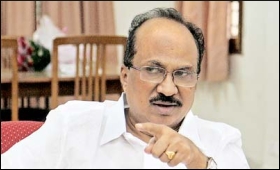|

|
Food security bill will be passed soon: K.V. Thomas
|
|

|
|
| Top Stories |
 |
|
|
|
SME Times News Bureau | 17 Jun, 2013
Congress chief Sonia Gandhi's pet food security bill is not getting delayed and will be passed soon, Food Minister K.V. Thomas said after Prime Minister Manmohan Singh deferred a government decree on the flagship welfare legislation and gave one last chance to evolving a consensus among the allies and the opposition.
"There is no delay. The bill will be passed soon. It takes time in a democracy," Thomas told IANS in an interview.
The bill, a part of the Congress manifesto for the 2009 general elections, is seen as a big-ticket legislation of the United Progressive Alliance government that could prove to be a game-changer ahead of the 2014 general elections.
The bill, which had been in the works for the past four years, was finally taken up for debate in the Lok Sabha during the budget session that ended May 8, but could not be passed as the BJP did not allow the house to run demanding the prime minister's resignation over allegedly irregular award of coal mining blocks to corporates.
The BJP's stance prompted the government to contemplate the ordinance route to indicate its sense of urgency in implementing the measure - that will provide subsidised foodgrain to 67 percent of the population - but would still have to be ratified by parliament.
Thomas said that as directed by the prime minister, discussions with the allies and the opposition parties have started to evolve a consensus on the bill but hinted they should not test the government's patience.
"If they (parties) are serious about the bill, it will be passed in a special session of parliament. Otherwise, the ordinance is still with the cabinet and can be taken up in the monsoon session (in July-August)," said Thomas.
Finance Minister P. Chidambaram has indicated that a special session of parliament could be called to debate on and pass the bill.
The Communist Party of India-Marxist, the Samajwadi Party that supports the government from outside and the Nationalist Congress Party (NCP), a part of the UPA, have expressed reservations against the bill and have pressed for a parliamentary debate on it.
Thomas welcomed a debate, saying the bill is a landmark legislation and both the central and state governments will have a role in implementing it.
"We are ready to discuss. It was the opposition which did not allow the bill to be passed in the previous session. It is up to them to support it," Thomas said.
Work on the food bill had started in 2009. The first draft was introduced in parliament in December 2011 and referred to a standing committee, which submitted its report in January 2013.
During the past two years, said the minister, the government has been working on other aspects related to the food security bill like improving food production and procurement and digitising the public distribution system (PDS) to check pilferage and building more space to store foodgrain.
"There is improvement on all these fronts but more work is needed," said Thomas.
"The food security bill is for the people of India. No other country has taken up such an ambitious welfare programme," he pointed out.
The food security bill aims to provide subsidised food grain to around 67 percent of India's 1.2 billion people. Around 800 million people - with limited income - would thus get subsidised foodgrain at an initial cost of around Rs.1.3 lakh crore (nearly $20 billion).
|
|
|
| |
|
|
|
|
|
|
|
|
|
|
|
|
|
|
| |
| Customs Exchange Rates |
| Currency |
Import |
Export |
US Dollar
|
₹91.35
|
89.65 |
UK Pound
|
₹125.3
|
₹121.3 |
Euro
|
₹108.5
|
₹104.85 |
| Japanese
Yen |
₹58.65 |
₹56.8 |
| As on 19 Feb, 2026 |
|
|
| Daily Poll |
 |
 |
| What is your primary "Make or Break" expectation from the Finance Minister this year? |
|
|
|
|
|
| Commented Stories |
 |
|
|
|
|
|
| |
|